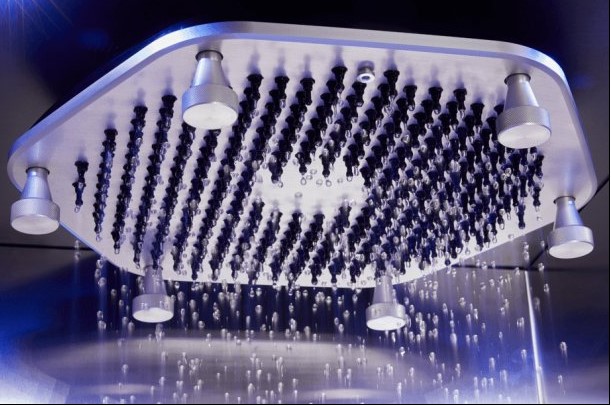

Trurain
The TruRain water repellency textile tester from James Heal, a UK-based producer of textile testing solutions, uses a tiny fraction of the energy and waste water of comparable equipment.
In clothing meant to protect the wearer in wet conditions, water repellency is an important function of technical fabrics from a safety and comfort perspective. The industry-standard method for mimicking artificial rainfall and the outdoor environment to test the water repellency of various textiles and clothing is known as the Bundesmann test.
Bundesmann testing equipment has been around for a while, but it has a reputation for being difficult and messy to operate. It also has a high environmental effect due to excessive water and energy use, which adds up to hefty operating expenses.
James Heal recognized a chance to advance things by concentrating on the problems that users face on a daily basis through better technology and design.
As a result, the next-generation Bundesmann tester with a water recirculation system is called TruRain. Based on a weekly regimen of performing 150 tests, the system consumes 99% less water during testing than the conventional choices available on the market, dropping consumption from 2,100 liters to just 23 liters.
Additionally, compared to a typical eight-hour shift, TruRain achieves significant energy cost savings, resulting in a total cost reduction of 83%. In addition to being easier to use than a standard Bundesmann, the tests may be run continuously for a week without the need to change the water, which increases productivity. The lab professionals utilizing the instrument are also happy to have an automated shower guard that prevents the operator from getting wet during testing.
Neil Pryke, James Heal MD, said that TruRain is a game-changer for sustainably conscious brands and manufacturers who are looking to improve their environmental impact and optimize costs. It is the only Bundesmann tester of its kind that reuses water during testing since it is outfitted with a special water recirculation system. Without compromising the precision and dependability of test results, this has considerable positive effects on the environment and enormous cost savings for our customers.
James Heal was founded in Halifax, West Yorkshire, in 1872, and produces textile testing equipment that is used all over the world. In 2014, the company joined the larger PPT Group, which includes a variety of sibling brands that specialize in testing various elements of materials and goods.
Eugène Riconneaus is launching ER Ocean Recherche, an R&D center focused on creating ocean-sourced sustainable materials for the fashion industry.
In line with sustainable shift, material science brand Pangaia has introduced its (Gaia)Plnt Nylon capsule, a collection made entirely from…
Boi Knit Lab is redefining the landscape of knitwear and textile innovation through its seamless integration of research, design, and…
A groundbreaking project titled "Development of Specialised Firefighting Suit" aims to reduce India’s dependency on imports of high-performance protective gear.
Eastman has unveiled Naia On The Move, a high-performance, sustainable fibre engineered for activewear and urban lifestyles expands the Naia’s…
X Tech has partnered with Fulgar to unveil a new line of performance garments crafted with Q-Skin, a cutting-edge polyamide…